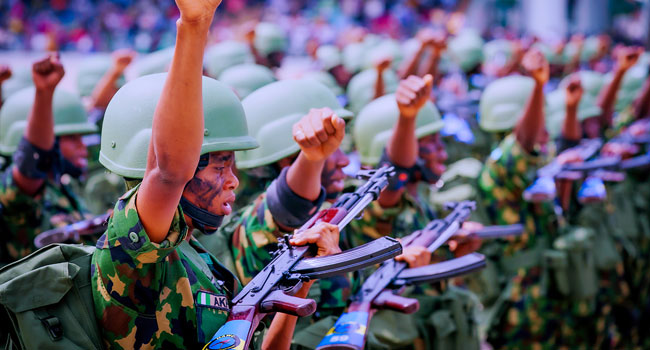The army on Saturday said the voluntary discharge of over 200 soldiers is not due to alleged corruption, poor service conditions and low morale, IgbereTV reports

The army was reacting to reports that 243 soldiers in the North-East and other theatres had applied for voluntary retirement.
Army spokesperson, Onyema Nwachukwu, confirmed the development but argued it was a routine process.
He described insinuations soldiers were leaving the military due to poor working conditions as “a concoction of the imagination of the unrepentant enemies of the nation and mischief makers and should be outrightly discountenanced by the public.”
“The subjective and unethical report is a distraction and another failed attempt at dampening the morale and fighting will of the loyal, dedicated and patriotic fighting force of the NA,” the statement added.
“Perhaps these impenitent mischief makers need to be schooled to understand that the NA is not a conscript Army and that recruitment into the NA is voluntary with extant policy on discharge and retirement of soldiers and officers respectively, like other organizations. This provides its personnel the opportunity to apply for voluntary discharge, when they deem fit and meet the terms and conditions as stipulated in the Harmonized Terms and Conditions of Service soldiers/ratings/airmen (Revised) 2017.
“It is thus, the inalienable right of a personnel to voluntarily or on medical grounds apply for discharge, if they meet the terms. It is therefore not an aberration that the COAS granted approval for 91 NA/32/4792 WO NDAGANA ISHIAKU and 242 others to voluntarily discharge from the NA, as being unprofessionally manipulated by some media.”
The army said such reports were targeted “at deflating the high morale of troops by downplaying recent critical interventions by the COAS Lt Gen Faruk Yahaya on troops’ welfare, which include car loans, housing loans, extensive construction of new accomodation, massive renovation of old and dilapidated accomodation, building of befitting residences and issuing of vehicles to Regimental Sergeant Majors, scholarship awards to children and wards of fallen heroes and other unique interventions in the theatres of operation to sustain the heightening morale of troops.






